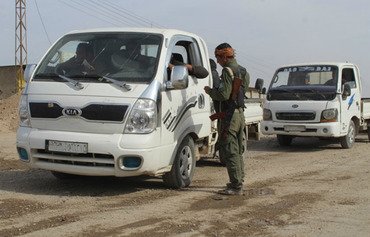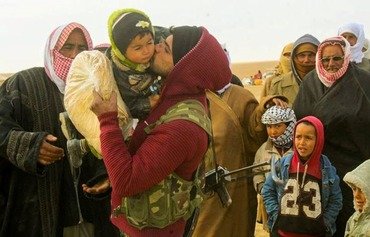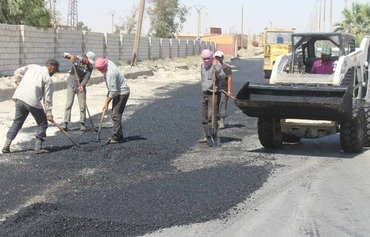The Syrian Democratic Forces (SDF) are preparing the city of al-Raqa for the post-liberation phase through long-term measures designed to maintain security, SDF officials told Diyaruna.
These include training internal security forces and traffic-control teams to take over security and law enforcement, as well as clearing the city and its surroundings of ISIS-planted mines and improvised explosive devices (IEDs).
The SDF on October 20th announced a "historic victory" over the "Islamic State of Iraq and Syria" (ISIS) in al-Raqa city and vowed to hand over power to a civilian administration.
But the SDF stopped short of transferring authority to al-Raqa Civil Council, because it said much ordnance disposal remained to be done before the city could be left in civilian hands.
![A member of a mine clearance agency affiliated with the Syrian Democratic Forces (SDF) takes part in dismantling mines from the entrance of al-Raqa city. [Photo courtesy of the SDF]](/cnmi_di/images/2017/11/10/10254-Syria-Raqa-mines-600_384.jpg)
A member of a mine clearance agency affiliated with the Syrian Democratic Forces (SDF) takes part in dismantling mines from the entrance of al-Raqa city. [Photo courtesy of the SDF]
"After the end of clearing operations ... we will hand over the city to al-Raqa Civil Council," said SDF spokesman Talal Sello.
"The SDF will fulfill their pledge to residents to train and equip security teams consisting entirely of al-Raqa natives to administer the liberated areas," said Mahmoud Ismail, an SDF commander from al-Raqa province.
Residents have turned out in large numbers to join the Internal Security Forces (ISF), traffic department and all other service sectors, he told Al-Mashareq.
"They want to actively participate in the process of rebuilding and returning things back to normal as much as possible," he said.
Ismail said the transfer of duties to the ISF will be delayed until the city and surrounding areas are fully cleared of mines and IEDs.
"Security centres will be ready in time for the return of residents to their homes and properties," he said, noting that some ISF units are currently stationed at the city’s entrances alongside SDF elements.
Security 'in the hands of the people'
Abdullah Haidar, a resident of Ayn Issa who has joined the ISF after fighting in the ranks of the SDF, said that upon the completion of the mine-clearing operation, the city will be transferred to the custody of the ISF.
"SDF military academies have trained hundreds of youth who have volunteered to work in the ISF," he told Diyaruna.
Several batches have graduated from those academies, he said, the last of which comprised 253 graduates in Ayn Issa.
"The new graduates will be assigned to various security posts in the city of al-Raqa and its rural areas," Haidar said.
Most graduates of ISF training courses are natives of al-Raqa province, he said, who are prepared to preform their work.
"The region's security will be placed in the hands of its own people," he said.
Rural al-Raqa native Fahim Darwish, 20, said he volunteered with the ISF to take part in protecting the areas liberated from ISIS.
He told Diyaruna that he, along with his peers, have become convinced that they must protect their areas with their own hands.
"The SDF has had a main role in the liberation and post-liberation phase," he said. "They did not abandon al-Raqa's residents in the past and will not do so now. They and the Asayesh forces are training and equipping us to maintain security in liberated areas."
Darwish, who was forced to drop out of school because of the war in Syria, said he hopes his role in helping maintain security in his city will allow Syrian children to receive an education away from extremist groups and conflict.
Al-Raqa littered with mines
The number of mines, explosives and booby traps left behind by ISIS in al-Raqa is the largest in any city the group has controlled, said Mustafa Ceylan, who belongs to a de-mining team affiliated with the Kurdish People’s Protection Units (YPG).
"It is not an exaggeration to say that every entrance to the city and every one of its roads, neighbourhoods, homes and shops are booby-trapped," he told Diyaruna.
Ceylan said that the sheer extent of the destruction of the city is making it very difficult to search for mines that may be under the rubble.
"Some places are major disaster areas, like the workshops the group used to manufacture IEDs and mines," he said.
SDF units have found two such workshops -- an IED and mine factory in the Tayyar district and a car bomb factory in al-Badou district, he said.
Civilians will return only after a full sweep of the entire city is completed and it is cleared of explosives, he said.
"Work is underway at the entrances and outer perimeter of the city as well as in some of the main service buildings that were not destroyed during the war," Ceylan said, adding that de-mining operations will subsequently move to the centre of the city.
Some mines and IEDs left behind by the group are buried underground, while others were used to booby-trap doors of houses, furniture, washing machines, refrigerators and ovens, Ceylan said.
Certain explosives are equipped with high-tech blasting detonators that are initiated by touch or minor vibration, he said, and others are wired to chemicals that react to changes in temperature.
Some civilians have returned
The SDF said in an online statement on Sunday (November 5th) that hundreds of families had returned to al-Meshleb, al-Raqa's easternmost district.
"The SDF informed civilians from al-Meshleb that they could return to their homes after mine-removal teams had finished clearing the entire neighbourhood of explosives left indiscriminately in civilian homes by ISIS," the force's press centre said.
It said the district was the first to which residents had returned since the city's "liberation from ISIS", AFP reported.
However, the SDF remain on high alert on the outskirts of al-Raqa to prevent civilians from entering the city and endangering their lives, said Ghassan Ibrahim, an SDF unit commander.
"Unfortunately, some civilians violated the instructions and tried to enter their home and the result was that nine of them died as soon as they entered their house in a large mine explosion," he told Diyaruna.
The city’s residents have become fully aware of the need to abide by the instructions communicated to them by teams deployed throughout the city, he said.
Residents appreciate the SDF's hard work, and "are convinced that the delay in their return to their properties and homes is absolutely necessary", Ibrahim said.
The mines have also claimed the lives of a number of SDF fighters who were taking part in the sweep operations, he added.
"The mines in al-Raqa are totally camouflaged, so their location is hard to predict," he said.
Sufyan al-Hillani, an al-Raqa native who owned a shop in the city and is currently in Ayn Issa, said he will not return before the city is declared free of explosives.
"The news that used to come from the cities and areas liberated from ISIS told of how the group booby trapped everything for the sole purpose of causing injury," he told Diyaruna.
"It does not make sense to survive the group and get to the safe areas only to mindlessly risk our lives now," he said.

![Graduation ceremony of the 12th batch of Internal Security Forces who will take over maintaining security in al-Raqa from the Syrian Democratic Forces (SDF). [Photo courtesy of the SDF]](/cnmi_di/images/2017/11/10/10255-Syria-Raqa-security-600_384.jpg)






